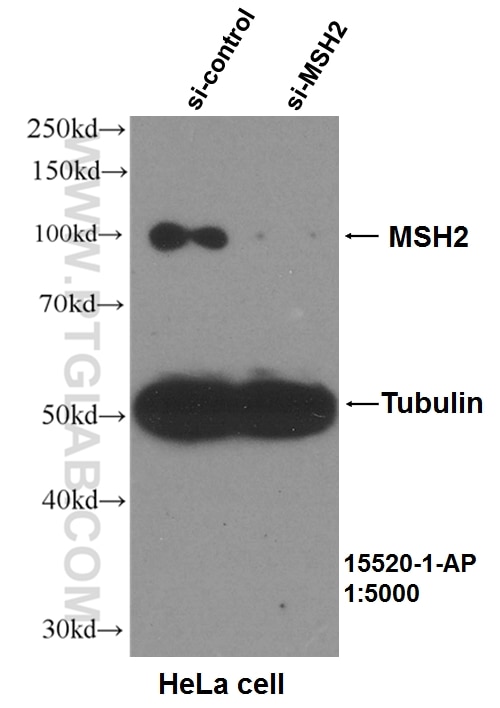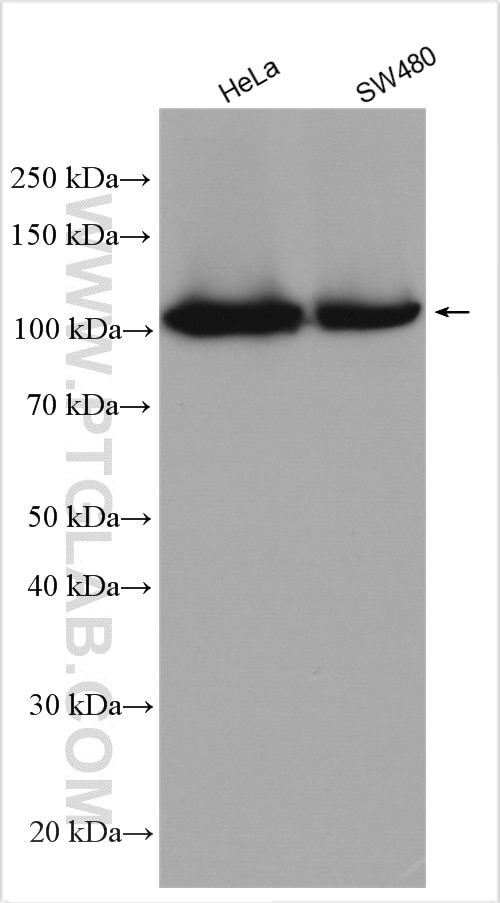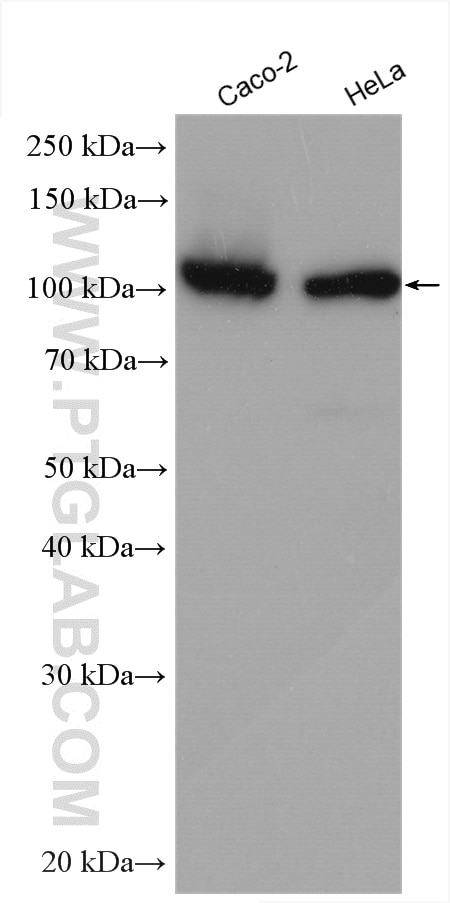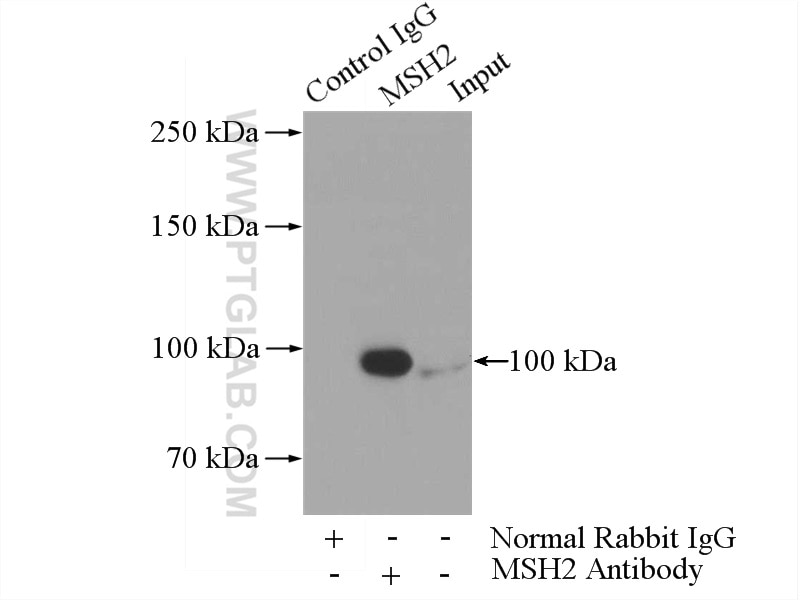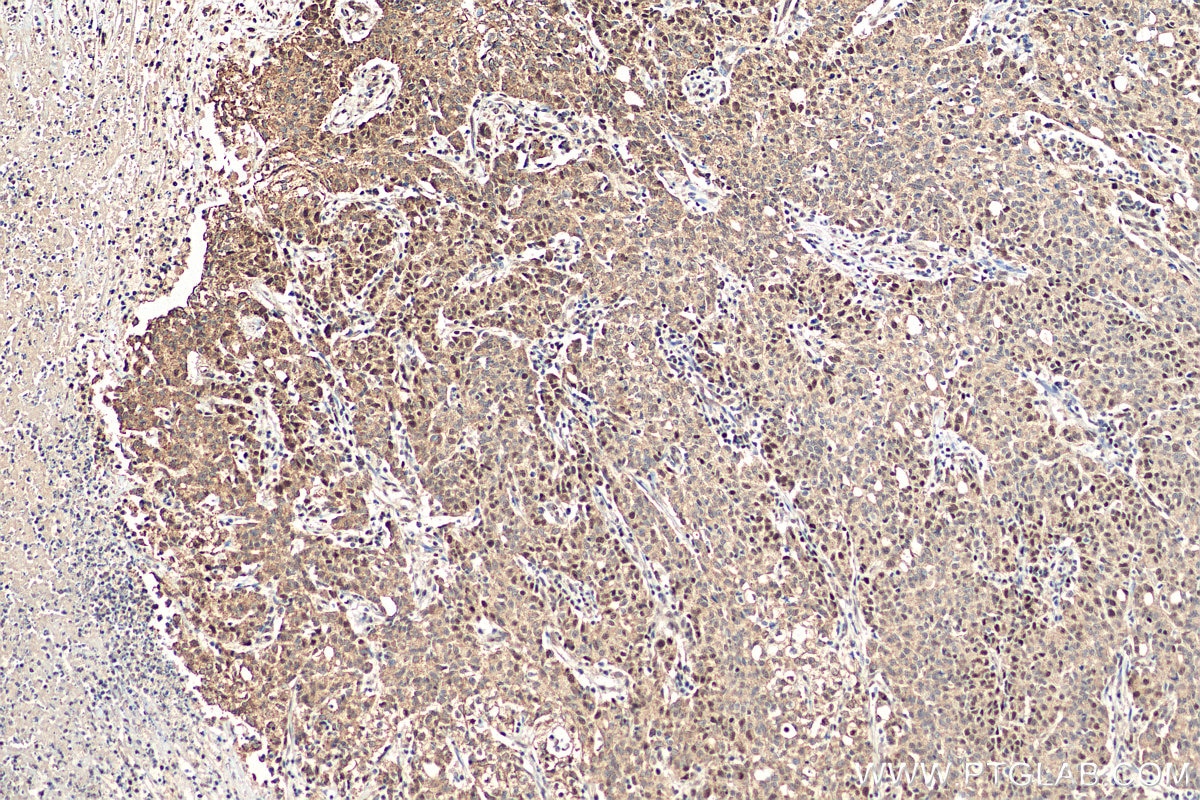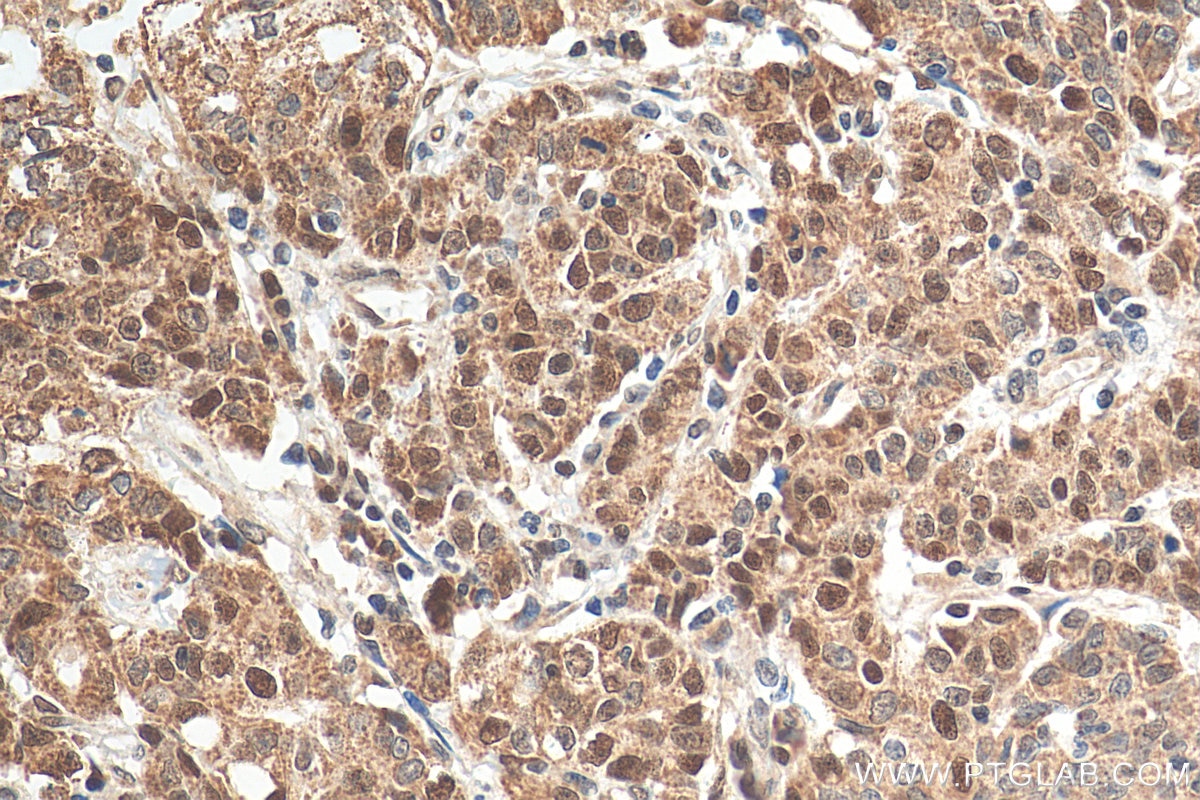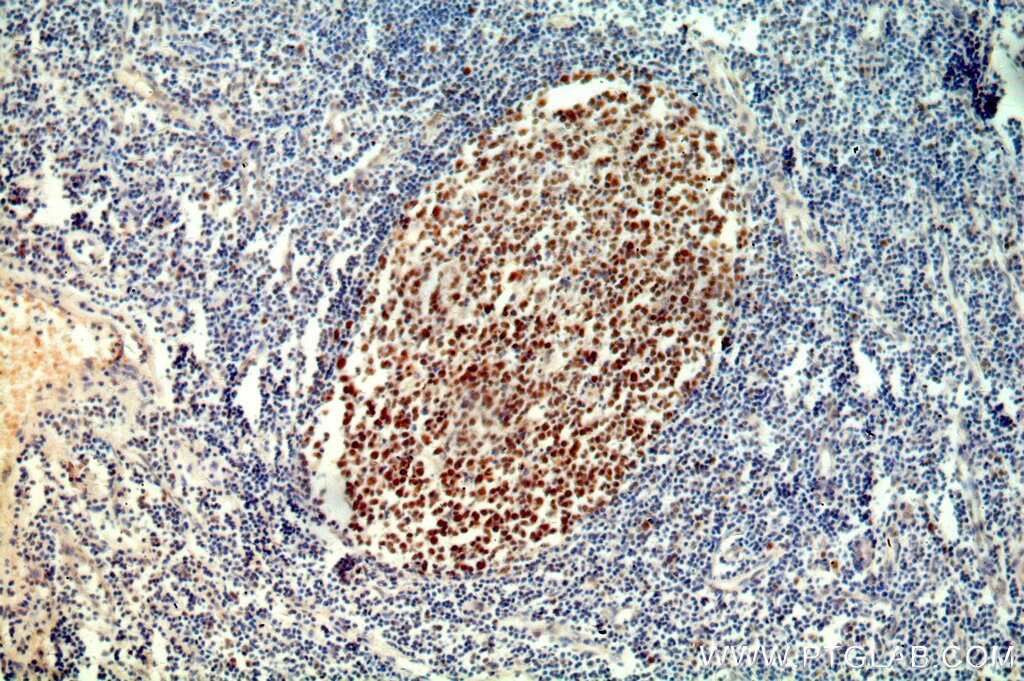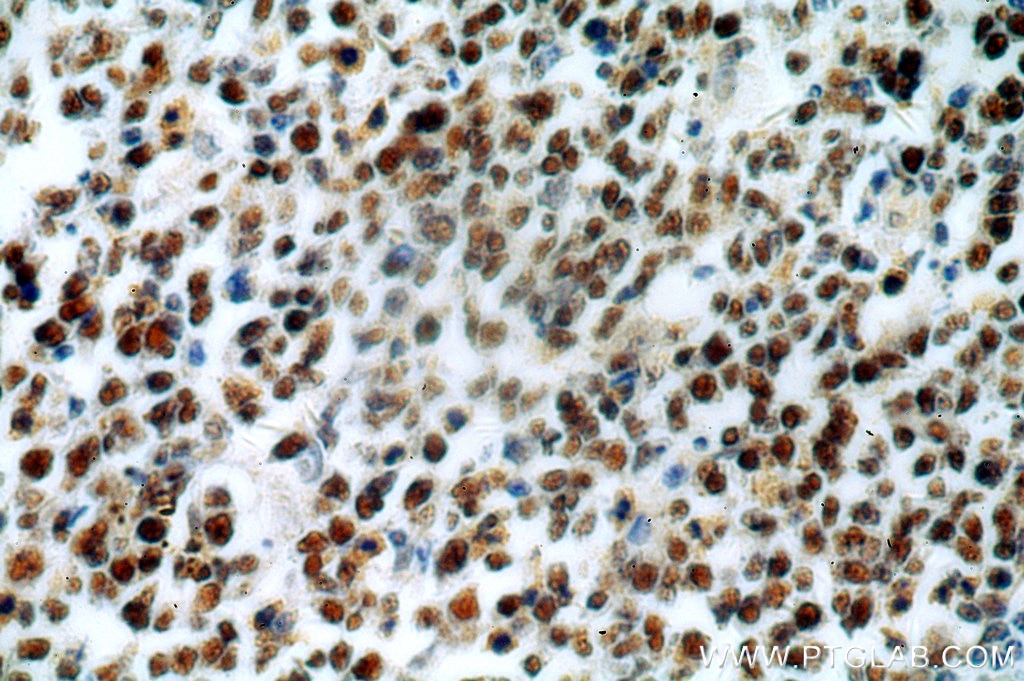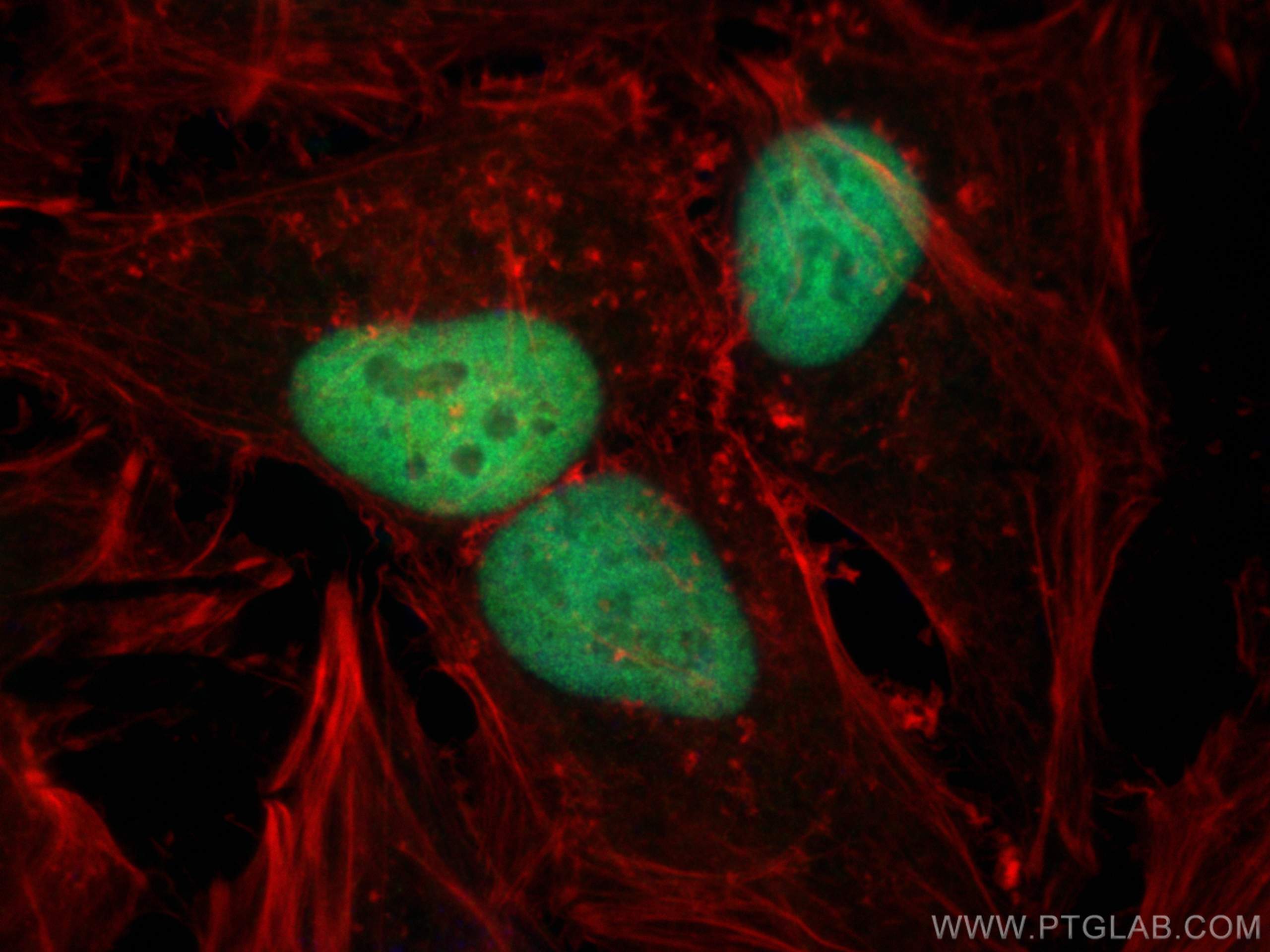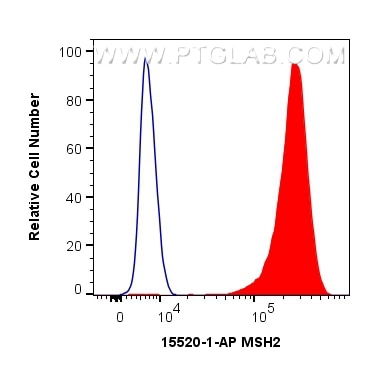Tested Applications
| Positive WB detected in | HeLa cells, Caco-2 cells, SW480 cells |
| Positive IP detected in | HeLa cells |
| Positive IHC detected in | human stomach cancer tissue, human tonsil tissue Note: suggested antigen retrieval with TE buffer pH 9.0; (*) Alternatively, antigen retrieval may be performed with citrate buffer pH 6.0 |
| Positive IF/ICC detected in | HeLa cells |
| Positive FC (Intra) detected in | HeLa cells |
Recommended dilution
| Application | Dilution |
|---|---|
| Western Blot (WB) | WB : 1:500-1:2000 |
| Immunoprecipitation (IP) | IP : 0.5-4.0 ug for 1.0-3.0 mg of total protein lysate |
| Immunohistochemistry (IHC) | IHC : 1:50-1:500 |
| Immunofluorescence (IF)/ICC | IF/ICC : 1:400-1:1600 |
| Flow Cytometry (FC) (INTRA) | FC (INTRA) : 0.40 ug per 10^6 cells in a 100 µl suspension |
| It is recommended that this reagent should be titrated in each testing system to obtain optimal results. | |
| Sample-dependent, Check data in validation data gallery. | |
Published Applications
| KD/KO | See 4 publications below |
| WB | See 18 publications below |
| IHC | See 15 publications below |
| IF | See 3 publications below |
| IP | See 2 publications below |
Product Information
15520-1-AP targets MSH2 in WB, IHC, IF/ICC, FC (Intra), IP, ELISA applications and shows reactivity with human samples.
| Tested Reactivity | human |
| Cited Reactivity | human, mouse |
| Host / Isotype | Rabbit / IgG |
| Class | Polyclonal |
| Type | Antibody |
| Immunogen |
CatNo: Ag7835 Product name: Recombinant human MSH2 protein Source: e coli.-derived, PGEX-4T Tag: GST Domain: 585-934 aa of BC021566 Sequence: SSGYVEPMQTLNDVLAQLDAVVSFAHVSNGAPVPYVRPAILEKGQGRIILKASRHACVEVQDEIAFIPNDVYFEKDKQMFHIITGPNMGGKSTYIRQTGVIVLMAQIGCFVPCESAEVSIVDCILARVGAGDSQLKGVSTFMAEMLETASILRSATKDSLIIIDELGRGTSTYDGFGLAWAISEYIATKIGAFCMFATHFHELTALANQIPTVNNLHVTALTTEETLTMLYQVKKGVCDQSFGIHVAELANFPKHVIECAKQKALELEEFQYIGESQGYDIMEPAAKKCYLEREQGEKIIQEFLSKVKQMPFTEMSEENITIKLKQLKAEVIAKNNSFVNEIISRIKVTT Predict reactive species |
| Full Name | mutS homolog 2, colon cancer, nonpolyposis type 1 (E. coli) |
| Calculated Molecular Weight | 105 kDa |
| Observed Molecular Weight | 100 kDa-105 kDa |
| GenBank Accession Number | BC021566 |
| Gene Symbol | MSH2 |
| Gene ID (NCBI) | 4436 |
| RRID | AB_2144799 |
| Conjugate | Unconjugated |
| Form | Liquid |
| Purification Method | Antigen affinity purification |
| UNIPROT ID | P43246 |
| Storage Buffer | PBS with 0.02% sodium azide and 50% glycerol, pH 7.3. |
| Storage Conditions | Store at -20°C. Stable for one year after shipment. Aliquoting is unnecessary for -20oC storage. 20ul sizes contain 0.1% BSA. |
Background Information
MSH2, named for its homologous to the E.coli MutS gene, takes part in DNA mismatch repair(MMR) to maintain the stability of DNA. MSH2 contains a helix-turn-helix domain, which responds for binding to DNA. Also, MSH2 has a direct role in mutation avoidance and micro-satellite stability in cell.
Protocols
| Product Specific Protocols | |
|---|---|
| FC protocol for MSH2 antibody 15520-1-AP | Download protocol |
| IF protocol for MSH2 antibody 15520-1-AP | Download protocol |
| IHC protocol for MSH2 antibody 15520-1-AP | Download protocol |
| IP protocol for MSH2 antibody 15520-1-AP | Download protocol |
| WB protocol for MSH2 antibody 15520-1-AP | Download protocol |
| Standard Protocols | |
|---|---|
| Click here to view our Standard Protocols |
Publications
| Species | Application | Title |
|---|---|---|
Cell Metab Nicotinamide metabolism face-off between macrophages and fibroblasts manipulates the microenvironment in gastric cancer | ||
Leukemia Targeting DNA polymerase β elicits synthetic lethality with mismatch repair deficiency in acute lymphoblastic leukemia
| ||
J Immunother Cancer KALRN mutations promote antitumor immunity and immunotherapy response in cancer. | ||
Cancer Lett Inhibition of KIF20A enhances the immunotherapeutic effect of hepatocellular carcinoma by enhancing c-Myc ubiquitination | ||
Hum Mol Genet Lack of association of somatic CAG repeat expansion with striatal neurodegeneration in HD knock-in animal models.
| ||
Cancer Prev Res (Phila) Estrogen stimulates the expression of mismatch repair gene hMLH1 in colonic epithelial cells. |

